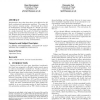Free Online Productivity Tools
i2Speak
i2Symbol
i2OCR
iTex2Img
iWeb2Print
iWeb2Shot
i2Type
iPdf2Split
iPdf2Merge
i2Bopomofo
i2Arabic
i2Style
i2Image
i2PDF
iLatex2Rtf
Sci2ools
132
Voted
GECCO
2006
Springer
2006
Springer
Structure and metaheuristics
Metaheuristics have often been shown to be effective for difficult combinatorial optimization problems. The reason for that, however, remains unclear. A framework for a theory of metaheuristics crucially depends on a formal representative model of such algorithms. This paper unifies/reconciles in a single framework the model of a black box algorithm coming from the no-free-lunch research (e.g. Wolpert et al. [25], Wegener [23]) with the study of fitness landscape. Both are important to the understanding of meta-heuristics, but they have so far been studied separately. The new model is a natural environment to study meta-heuristics. Categories and Subject Descriptors F.2 [Theory of Computation]: ANALYSIS OF ALGORITHMS AND PROBLEM COMPLEXITY General Terms Algorithms,Theory Keywords Theory, Representation, No Free Lunch, Heuristics
Difficult Combinatorial Optimization | Formal Representative Model | GECCO 2006 | Metaheuristics | Optimization |
Related Content
| Added | 23 Aug 2010 |
| Updated | 23 Aug 2010 |
| Type | Conference |
| Year | 2006 |
| Where | GECCO |
| Authors | Yossi Borenstein, Riccardo Poli |
Comments (0)

